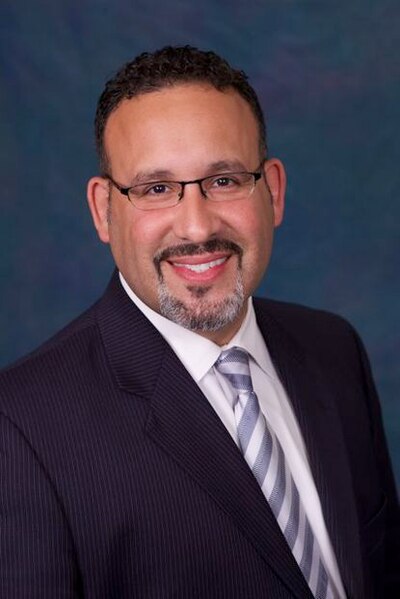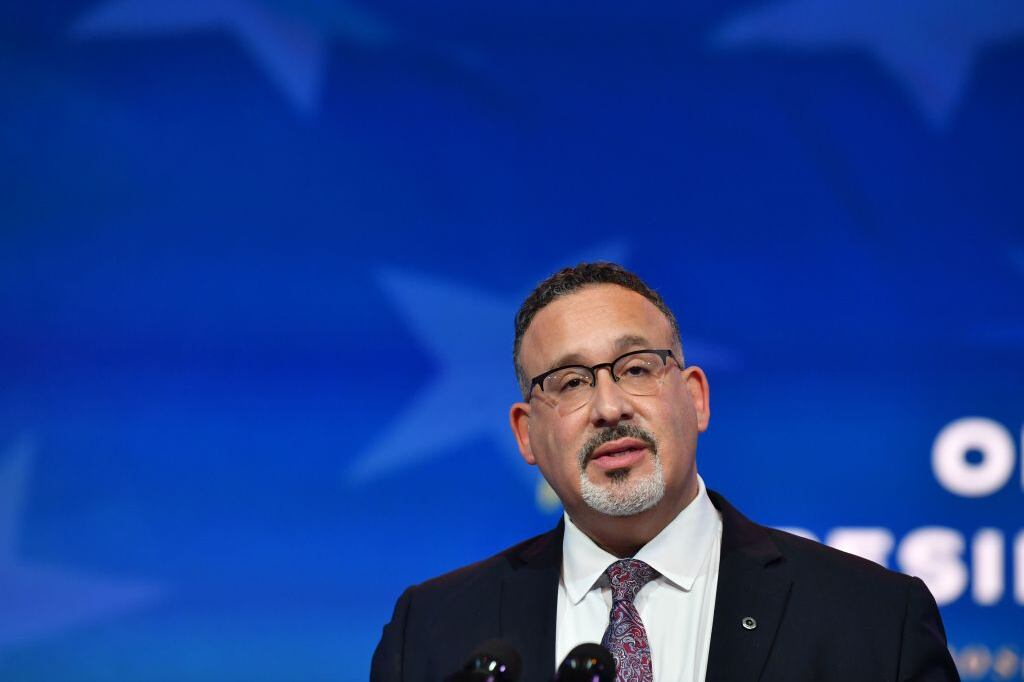President-elect Joe Biden will nominate Miguel Cardona to become the country’s education secretary, Biden announced Tuesday.
Choosing the Connecticut education commissioner, a relative unknown on the national stage, allows Biden to briefly sidestep fraught debates over charter schools, teachers unions, and testing that have divided his party. Biden would also fulfill his promise to nominate a former public school teacher to replace Education Secretary Betsy DeVos.
“In Miguel Cardona, America will have an experienced and dedicated public school teacher leading the way at the Department of Education — ensuring that every student is equipped to thrive in the economy of the future, that every educator has the resources they need to do their jobs with dignity and success, and that every school is on track to reopen safely,” Biden said in a statement.

If confirmed, Cardona will oversee the federal education department as schools grapple with the unprecedented disruption caused by the coronavirus pandemic. As commissioner in Connecticut, Cardona encouraged schools to reopen their buildings, but with mixed success, as only about a third of students in the state have access to full-time in-person instruction.
He will likely face the same challenge on the national stage. The role of U.S. education secretary is a limited one, as states and school boards make most education policy decisions. But the position took on increased prominence under DeVos, and Biden’s education secretary is set to oversee the dispersal of tens of billions of dollars in new federal relief — and to decide whether states can cancel federally required tests this year.
If Biden was counting on Cardona to be a unifying choice, the bet paid off Tuesday, with a wide array of education groups praising the pick.
Cardona also adds to the diversity of Biden’s cabinet, a top priority for the president-elect. Cardona is Latino and as a child was an English learner, and he has focused on improving outcomes for those students throughout his career. His doctoral dissertation, the CT Mirror reported, was about building political will to end the “normalization of failure” of English learners.
Cardona’s biography makes for a sharp contrast with DeVos, a billionaire philanthropist who focused on private schools. He grew up in public housing and didn’t speak English until starting school. And his career has been spent almost exclusively inside public schools and within a single school district.
Cardona began his career as an elementary school teacher in Meriden, Connecticut. He quickly became a school principal — the youngest in the state at 28, according to the local Record-Journal. He then served as the district’s assistant superintendent before being named the state schools chief.
He seems to have won affection locally, with city officials and Gov. Ned Lamont offering praise as his name was floated in recent days. “I don’t want to lose him,” the governor said. “He understands the challenges of our students and a district like Meriden,” the city’s mayor said.
Cardona’s management experience is fairly limited, though. He never oversaw a school district before being appointed schools chief in August 2019 by Lamont.
The pandemic has dominated Cardona’s tenure. He has pushed schools to keep their buildings open, emphasizing the benefits of in-person school, especially for struggling students. When several districts decided to switch to all-remote learning after Thanksgiving, he challenged the move, saying the virus isn’t spreading in schools.
Cardona has allowed districts to make their own calls, though. “When a superintendent tells me, ‘Miguel, my staffing is so bad that I have to close the school because I don’t have enough staff to keep it safe,’ I respect that decision,” Cardona said in November.
That stance has prompted criticism from some who say he should have intervened as districts chose not to reopen. It’s also garnered pushback from the other side: teachers and their unions who have circulated a petition urging Cardona and Lamont to close schools that they said weren’t fully complying with safety guidelines.
Biden’s choice of Cardona represents a less union-aligned approach than some other potential picks. AFT President Randi Weingarten and former National Education Association President Lily Eskelsen García were themselves reportedly under consideration for the role.
Still, Cardona is likely to have a much closer relationship with the country’s two major teachers unions than his predecessors in both the Trump and Obama administrations.
“Miguel Cardona’s formative experience as a teacher and administrator has been critical to his accomplishments as Connecticut Education Commissioner,” a coalition of Connecticut labor unions said in a joint statement last week. “If selected as Secretary of Education, Dr. Cardona would be a positive force for public education — light years ahead of the dismal Betsy DeVos track record.”
In 2013, the American Federation of Teachers highlighted Meriden, Connecticut, where Cardona was then an assistant superintendent, as a model for labor-management partnerships. He was in charge of the district’s teacher evaluation system, and the AFT profile suggests that he prioritized getting teacher buy-in.
Both Weingarten and Eskelsen García praised Cardona’s nomination Tuesday.
If confirmed, Cardona will also face an immediate decision that could further illuminate his relationship with unions: whether to allow states to cancel federally required annual testing this year. Unions are pushing for the Biden administration to do so, but some civil rights groups say that testing must continue to measure learning gaps.
Connecticut, like every state in the country, canceled state testing last school year. But unlike a number of other states, Connecticut has not sought a waiver from testing in spring 2021, a spokesperson for the state education department said. Instead, Cardona’s department issued a memo in October saying the tests would go on.
“State assessments are important guideposts to our promise of equity,” the memo said.
Cardona, though, has criticized linking state tests to teachers’ evaluations. “Not reducing a teacher to a test score and bringing the voices of teachers and leaders into the process of professional learning — those are the two things I really felt like I had to champion,” he said about his work on a state evaluation committee.
On two other particularly contentious education issues, charter schools and private school vouchers, Cardona has a limited track record.
While the Obama administration championed charter schools, and the Trump administration sought (unsuccessfully) to expand access to private schools, Biden has promised to focus on neighborhood district schools while limiting, but not entirely restricting, charters. Cardona’s philosophy seems in line with the President-elect’s, although his influence on the issue as education secretary would be limited.
“Charter schools provide choice for parents that are seeking choice, so I think it’s a viable option,” he said during his Connecticut confirmation hearing. But neighborhood schools are “going to be the core work that not only myself but the people behind me in the agency that I represent will have while I’m commissioner.”
“He is much more of an educator than a politician or an ideologue — he’s not pro-charter or anti-charter,” Dacia Toll, CEO of Achievement First, a charter network that started in Connecticut, said in an interview.
Cardona’s department authorizes the network’s charter schools in the state. When their charters were up for renewal, Toll said, “The state department under him was certainly willing to praise us on the things we were doing well and push on the things we were not doing as well. It felt very fair.” After the network garnered a reputation for high-quality remote instruction during the pandemic, Toll noted, state department officials observed several lessons.
Cardona is likely to prioritize the education of English language learners, a population of students who have faced particular challenges during the pandemic. Asked earlier this year about the quality of education those students were receiving in Connecticut, he responded: “Not good enough. Not good enough. We have to focus on that more.”





